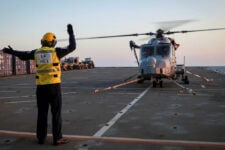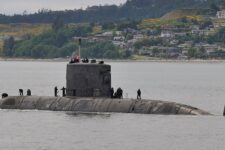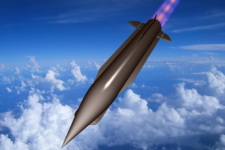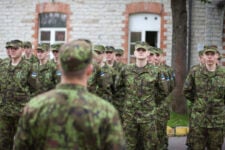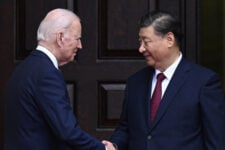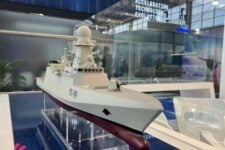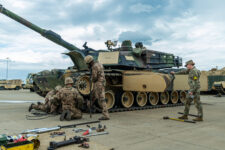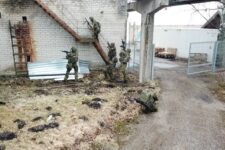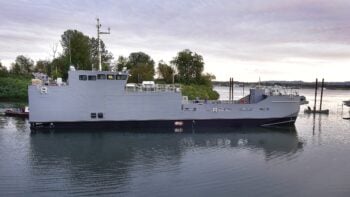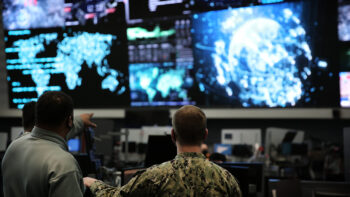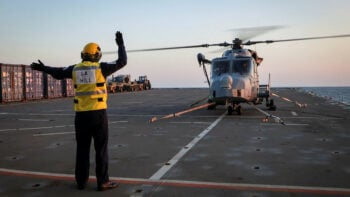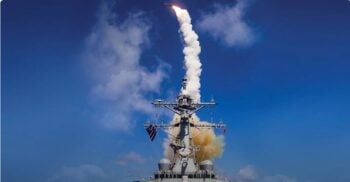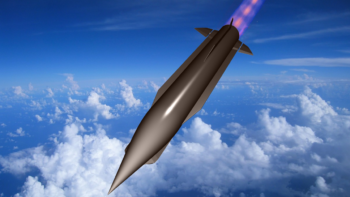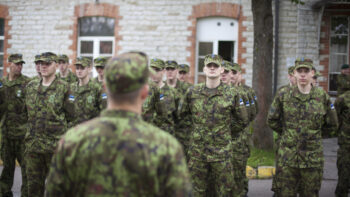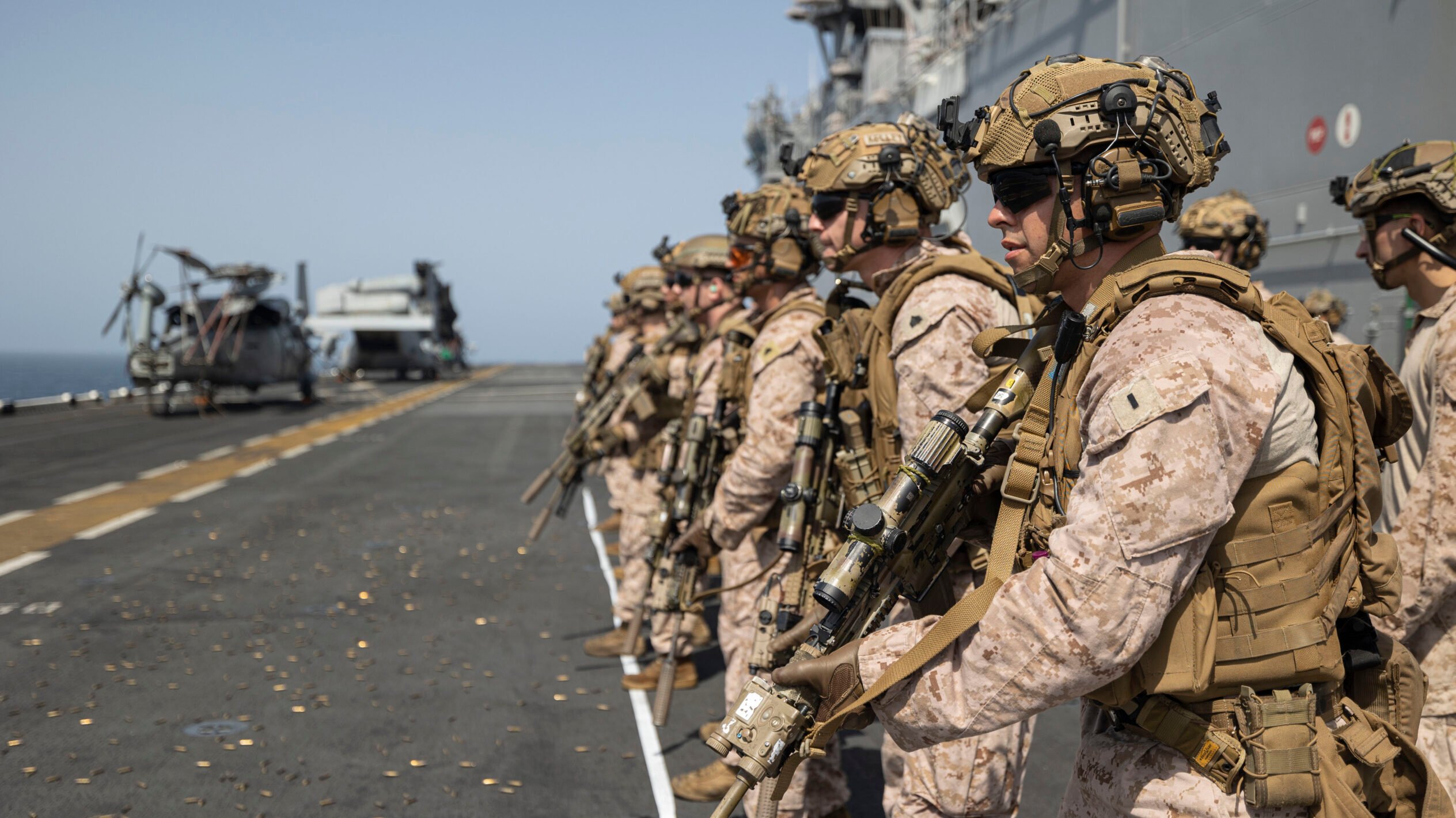
U.S. Marines conduct weapons training aboard amphibious assault ship USS Bataan (LHD 5) in the Gulf of Aden, Aug. 11, 2023. Components of the Bataan Amphibious Ready Group and 26th Marine Expeditionary Unit are deployed to the U.S. 5th Fleet area of operations to help ensure maritime security and stability in the Middle East region. (U.S. Marine Corps \/Sgt. Matthew Romonoyske-Bean)
DUBAI — The US is bolstering its presence in the Gulf waters, with US Central Command announcing on July 20 that an amphibious ready group, along with some 3,000 sailors and Marines were being deployed in the region. But a potentially bigger change in policy could be brewing, one which experts say would potentially curb attacks by Iran on ships going through the Strait of Hormuz.
An Aug. 11 report from USNI stated that some 100 Marines of the 26th Marines Expeditionary Unit have been trained and are ready in Bahrain to provide armed security on board merchant ships crossing the Hormuz Strait. This would reportedly put small groups of armed American forces onto foreign-flagged ships, in order to discourage Iranian attacks.
When asked about the report, Cmdr. Tim Hawkins, US 5th Fleet and Navy Central Spokesman, did not deny it, saying “There has been no announcement on this” and declining to “speculate” about future policy.
On its face, the concept of having US forces on these ships to effectively act as a tripwire – scaring Iran away from actions that could lead to a shootout with US forces, and in turn create a broader international incident than the gray zone Tehran likes to operate in – could be successful, analysts said.
Anthony Cordesman, the emeritus chair in Strategy at the Center for Strategic and International Studies, told Breaking Defense this step “is a minimal U.S. action to discourage Iranian harassment or seizure of ships moving in the Gulf, signaling that if Iran halts such ships there will be immediate notification of its actions by the U.S. and possible escalation.”
“A US Marine detachment would be authorized to repel boarders with lethal force, and this would be a major escalation risk for Iran,” said Michael Knights, a Middle East defense analyst and Fellow at the Washington Institute for Near East Policy. “I would expect such detachments to be deployed on some, but not all tankers carrying US cargoes at moments of high risk, such as the days after a US seizure of Iranian oil cargo anywhere in the world.”
But Bilal Saab, senior fellow and director of defense and security program at the Middle East Institute, warned that “In theory, this deployment should bolster the US deterrence, but in reality, nobody knows whether it will. Deterrence, especially with an opaque regime such as Iran’s with which the United States has no effective channel of communication, is complicated business.”
There is speculation that the Iranian Revolutionary Guards (IRGC) have escalated their attempts to seize ships in the Gulf waters in retaliation for the US decision in April to confiscate Iranian oil on tankers seized by the Navy for violating American sanctions on Iran. In early July, the US Navy had to act to prevent the IRGC from seizing a pair of merchant ships, and just two days later the IRGC successfully seized a tanker.
The threat from Iran helped drive the decision to send the USS Bataan Amphibious readiness Group and the 26th Marine Expeditionary Unit to the region. The US has also bolstered its air power, with the recent additions of F-35s and A-10s on rotation.
Hawkins stated that “the added forces provide significant operational flexibility and capability as we work alongside international partners to deter destabilizing activity and deescalate regional tensions caused by Iran’s harassment and seizures of merchant vessels earlier this year.”
Saab described the recent deployments and planned measures of using the Marines on board merchant vessels “as part of CENTCOM’s new flexible and dynamic employment approach. You don’t need to have too many permanent forces. You scale up depending on needs and threats.”
He added: “I see the future (CENTCOM) focusing more on access and less on size and permanent basing.”
However, that flexibility can cut both ways. Knights and Cordesman expect Tehran to continue to display acts of defiance, but find creative ways to avoid direct confrontation with US forces.
“Iran cannot appear to be frightened of the US so it will find new ways to appear defiant. Most likely, they will repeat a tactics they used before: to ‘seize’ tankers the Iranians themselves are using to smuggle oil, and show it as an example of the inability of the US to protect vessels,” Knights said.
Cordesman pointed out that “Iran will object, charge the US with being aggressive and seeking to dominate Iran and the region. It may or may not seize a ship with US guards, put Iranian vessels in one’s path, or take action against a ship that does not have US Marines on it.”
TAI exec claims 20 Turkish KAAN fighters to be delivered in 2028
Temel Kotil, TAI’s general manager, claimed that the domestically-produced Turkish jet will outperform the F-35 Joint Strike Fighter.

